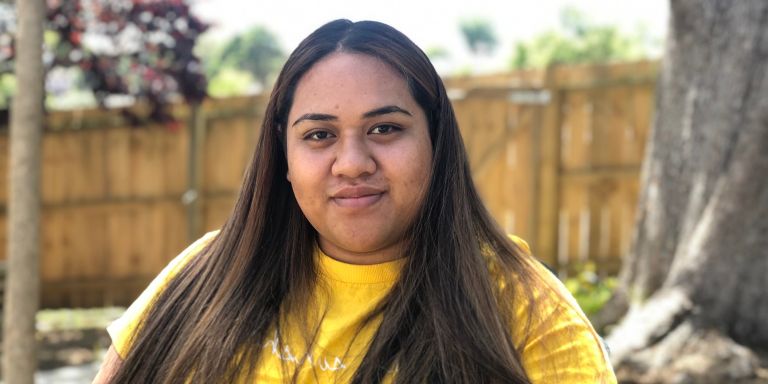Our July intake for this programme is now closed.
Programme highlights
Learn how to identify the determinants of health and find solutions to health inequalities facing Māori, Pasifika and other population groups in Aotearoa.
Build practical skills to design, implement and evaluate public health initiatives by creating your own health promotion project.
Customise your coursework to focus on your specific area of practice or your particular community of interest.
Learning will be through a mixture of online learning resources, workshops and workplace experience, allowing flexibility for part-time study while still working. Applicants are invited to apply from anywhere in Aotearoa.
Click here for more information and to see full graduate outcomes for this programme.
You’ll be supported to succeed throughout your health journey. At the Manukau campus, you will have access to Kaiawhina, a Pasifika support person, a Whānau and an Mā Tātou room.
If you are Māori or Pasifika, find out how you could be supported on your MIT journey with Te Ara Oranga.
Scholarship opportunities. There are also several scholarships available to Māori and Pasifika studying towards a health qualification. Register with Kia Ora Hauora and get access to their comprehensive scholarship database.
Other programme information:
- IT requirements. To complete this qualification you will need to have access to a computer and the internet to retrieve course materials, undertake assessments and to participate in course online activities.
Please note: Vaccination for COVID-19 is no longer an expectation for workers (including student health and wellbeing support staff) in the public health system. Health NZ published a notice on 19 December 2024 stating the Pre-employment COVID-19 Vaccination Policy is withdrawn. This means that while getting vaccinated for COVID-19 is still highly recommended, it won’t be expected of students. Students in Health and Wellbeing programmes at MIT will no longer be required to be vaccinated for COVID-19 or provide proof of vaccination to MIT. Other immunisation requirements are still in place (please see your programme information for details). To protect yourself and others, it is important to stay up to date with the latest COVID-19 vaccines as the virus changes, follow the latest immunisation recommendations, and be aware of any new infectious disease risks in your area.
Entry requirements
Applicants must meet the following criteria for admission into the programme:
Entry for adult learners is open, subject to the learner meeting minimum literacy and numeracy requirements, sufficient to enable them to successfully complete the programme of study and/or training such as a level 4 qualification;
OR
Learners who have left secondary school within two years of enrolling in a programme that leads to the award of this qualification, are required to have achieved a minimum of 40 credits at NCEA level 3, or equivalent.
Applicants are required to attend an interview to determine their suitability for the programme. During the interview the applicant will be assessed against the requirements of the Faculty’s policy for students accessing placements in the health context in terms of their suitability for placement in the public health sector, working with vulnerable populations including children and their motivation and suitability for future work in the public health context.
English language entry requirements
Applicants must have sufficient competence in the English language to undertake this programme which is taught and assessed in English. This will be demonstrated by meeting the current NZQA requirements.
International students: English language entry requirements
For the minimum English language requirements refer to the requirements set out in the NZQF Programme and Accreditation Rules https://www.nzqa.govt.nz/providers-partners/qa-system-for-teos/english-international-students/
Have English language competence to undertake this programme which is taught and assessed in English. Any applicants whose first language is not English will be required to provide evidence of an-overall IELTS (Academic) band score of 6.0 (with no score below 6.0) or equivalent achieved within the preceding 2 years.
Applicants of this programme will need to undergo police vetting and safety review process to meet the requirements of the Vulnerable Children’s Act. Immune status requirements as per industry needs.
Special & discretionary admission
Any ākonga who is 20 years of age or older and has not reached the general admission requirements for their intended programme is eligible for Special Admission. Te Pūkenga works with the ākonga to ensure they are prepared for their intended programme. Any ākonga who is not yet 20 years of age and has not reached the general admission requirements for their intended programme may be eligible for Discretionary Admission. In assessing whether to grant Discretionary Admission, the delegated authority focuses on the applicant’s level of preparedness for their intended programme.
Give yourself credit with Recognition of Prior Learning (RPL)
Did you know you can use the knowledge and experience you already have to your advantage?
Your previous work experience and on-the-job skills, volunteering, professional development, and other providers’ qualifications can be recognised as prior learning, matched against credits in our courses, and put towards your qualification – potentially saving you money and possibly helping you to complete your qualification faster Learn more.
Programme structure
You will need to complete the below six courses (60 credits):
Do you want to study a single course, without enrolling into the full programme?
Courses within some of our programmes may be offered as an individual Certificate of Proficiency (COP). Programme entry requirements and course fees apply. For more information, please speak to our friendly Ask Me! team.
Career opportunities
Settings for public health and health promotion practitioners include:
- Regional public health and immunisation programmes
- Breast screening, cervical screening campaigns
- Youth Health
- Gambling and addictions
- Family violence
- Rainbow Health
- Environmental health
Graduates of this programme may choose to apply for entry to a bachelor’s degree in public health or health sciences.
For potential salaries visit careers.govt.nz.













